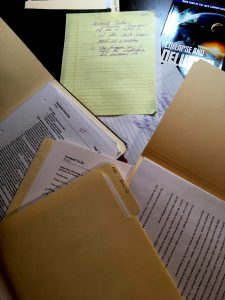Three Legacy Novels
 Why should writers’ blogs, including my own, continue to spout, in glorious marketing-ese dialect, a sort of Chamber of Commerce civic boosterism about our stunning writing careers and our usually boring buy-my-book blurbs? Why should I post as if everything I’ve written should be considered, whether anyone including me believes it or not, as a potentially life-changing, culture-altering bestseller? Most writers don’t blog about their failed novels or raise doubts about whether problematic works in progress are worth publishing, as if the very difficulty inherent in experimenting with a novel idea, in composing fiction, will later affect its market value. But maybe it’s time to discuss three novels that have given me a lot of trouble even as they’ve compelled me to keep turning back to them.
Why should writers’ blogs, including my own, continue to spout, in glorious marketing-ese dialect, a sort of Chamber of Commerce civic boosterism about our stunning writing careers and our usually boring buy-my-book blurbs? Why should I post as if everything I’ve written should be considered, whether anyone including me believes it or not, as a potentially life-changing, culture-altering bestseller? Most writers don’t blog about their failed novels or raise doubts about whether problematic works in progress are worth publishing, as if the very difficulty inherent in experimenting with a novel idea, in composing fiction, will later affect its market value. But maybe it’s time to discuss three novels that have given me a lot of trouble even as they’ve compelled me to keep turning back to them.
I touched on this theme in a 2012 blog post, How Do you Deal With Your Backlog? While I still don’t want to push old crap out into the world just because I’m emotionally attached to my work and happen to know how easy it is to self-publish it on a variety of platforms, I do have three legacy novels I want to continue to work on. I’m defining a “legacy novel” as a past work, out of date in many ways but which still has psychic reverberation demanding attention. I would publish these novels unless they fail the test of one last clear-eyed revision, in which case I’ll know to shelve them as writing exercises.
I had this experience once before with a twenty-five-year-old novel I rewrote in 2009, The University of Mars. But after doing a decent and actually fun revamp on it and then garnering seven rejections, I finally took a sober look at this book and realized I had to consider it a not-to-be published exercise. That novel is what I had in mind in the February 2012 blog post:
… but a new consideration arose: suppose I did get one of these “not quite my best” novels published? And what if it were available on Barnes and Noble and amazon.com right next to my best work? Suppose someone bought a “not quite” and justifiably wrote me off as low quality and never saw the good stuff? In shock I realized that trying to push out something not quite right is actually a pollution of your writing life.
I have three legacy novels in different stages of development, but I want to be mindful of that 2012 post’s warning. I even said then that I had no qualms about publishing Sortmind or Akard Drearstone, but I’ve seen since that those two need a lot of work to function as modern consciousness.
So here are the three, in the order I’m tackling them, with links to their background pages on sortmind.com:
Jump Grenade , with a 2008 first draft and a May 2017 second draft, is about a psychopathic but supernaturally gifted fourteen-year-old basketball player. I did a fast and enjoyable second draft of this novel in May, and while I really love it, I haven’t made a final determination on whether I think it’s publishable. Is it just a silly, over the top joke? I think it has worth, but … then again … no wonder I’m a double Libran! Is it right for me to laugh out loud at my own novel as I’m writing it?
, with a 2008 first draft and a May 2017 second draft, is about a psychopathic but supernaturally gifted fourteen-year-old basketball player. I did a fast and enjoyable second draft of this novel in May, and while I really love it, I haven’t made a final determination on whether I think it’s publishable. Is it just a silly, over the top joke? I think it has worth, but … then again … no wonder I’m a double Libran! Is it right for me to laugh out loud at my own novel as I’m writing it?
Akard Drearstone, begun in 1976 (!!!), chronicles the rise and fall of a rock group living in a commune north of Austin in the seventies. This now qualifies as “historical fiction.” In the current Draft 12 I’ve left the novel in the past so I don’t have to worry about things like smartphones with GPS, which can definitely play havoc with a murder/kidnapping plot. However, I’ve revised this thing so much over the years that I wonder what sort of real energies are left. Have my various cuts from the original, scarcely believable 661,000 words to 123,000 at last count simply eviscerated the novel? I think any writer has probably gotten to the point of exhaustion on endless tweaks even on a good novel about to be sent off to a publisher, so mostly it’s just that … I can’t tell yet.
Sortmind, begun in 1987, started as an homage to my early library career amid the beginnings of PC use in libraries, but by 2016 morphed into the story of a start-up company’s invention of an app providing all known information telepathically, and the urban riots which ensue in response. Somehow the book also manages to include two sets of aliens with opposing ideas about dealing with this malfunctioning human race, and it also serves as a Bildungsroman for the teen characters. Like Akard, this novel has seen perhaps too many revisions, and in some sense it’s remained a sprawling rough draft through all of them. I’m up to Draft 8 on it, and I certainly hope it comes together soon. In any case I wound up naming my website for this novel.
I have two motives for wanting to complete these three novels, hopefully this year if not early next:
- To finish all legacy work as I continue to move into new writing. I haven’t been stuck in my writing past and have been working on new fiction, but then again these three do have me looking backwards.
- To redeem/explore/express the karma of having written these novels. What did they all mean as I first composed them? What do they mean now? Are they modern in any sense? Are they a contribution of any sort, even a humble one, or are they just student exercises, failed experiments, or warm-ups for subsequent work?
If I think any or all of the three should come into the world, I’ll self-publish them. Part of their karmic legacy aspect is that I just don’t feel up to months or years of submissions and publisher interaction. Their nature needs to be determined now. And if I decide not to publish any of these, I’ll definitely follow up with a merciless blog post about why.
copyright 2017 by Michael D. Smith
Related topic: An Archeological Excavation of Akard Drearstone, Draft 1

Pingback:Amid Work on Three Karmic Novels – Sortmind Blog
Pingback:Amid Work on Three Karmic Novels – Sortmind Blog – Michael D. Smith
Pingback:A Writing Biography, Part VIII: The Exoskeleton, Archiving, Publishing, The Blog, and the Long Novels, 2011-2023 – Sortmind Blog – Michael D. Smith